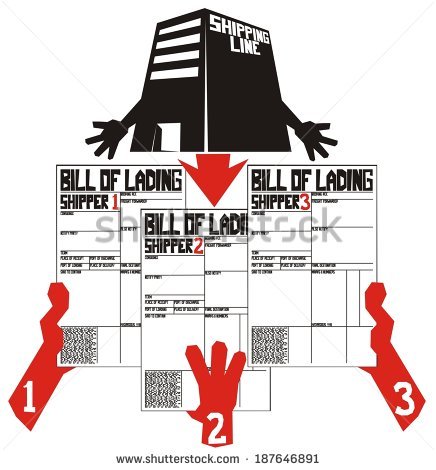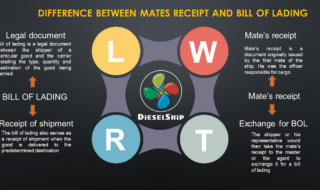Bill of Lading

Bill Of Lading (BOL)
Bill Of Lading Definition:
Section 6 of Bill of lading act 1856 defines Bill of lading as the document, which acknowledges the receipt of goods for shipment, received on-board a particular ship for carriage by sea and delivery to shippers order.
Halls Bury Law Of England (Legal Dictionary)
According to Halls Bury Law BOL is a document of title signed by the ship owner or his agent or the master of the ship, which acknowledges the receipt of certain specified goods, shipped on-board a particular ship on certain terms and conditions under which it is delivered to ship and is received by the ship. The terms and conditions are called as contract of Affreightment.
Characteristics of Bill Of Lading
Prima Facie Evidence
- It is the Prima Facie (On the face of it) evidence of the receipt of goods for shipment on-board a ship. It binds the ship owner stopping (Deny) the receipt of goods under later date.
Conclusive Evidence
- Every BOL in the hands of a bonafied holder (Consignee, Endorsee, Assignee) shall be conclusive evidence of shipment of goods against the carrier of his signatory.
General Remarks
- Any general remarks on the BOL are sub serviant to specific clause or remarks of the terms and condition of carriage.
Estoppel of ship owner as to condition of goods
- While preparing a BOL the carrier must be extremely careful to state the actual condition of goods (Damaged, Bad, Rotten, Spoiled… etc). If he fails to state the actual condition of goods at the time of receipt in BOL, he would be liable for cargo claims at the time of delivery. When the consignee raises the claim on damaged goods that time the ship owner will be stopped from stating that the goods were in condition at the time of receipt for carriage.
Bill of Lading as Evidence of existence of contract of Affreightment
- BOL is merely a receipt given by the carrier for the cargo received onboard for shipment. Only the master or the agent signs it. A contract is required to be signed by both the parties. Since only one party signs the BOL it is only a receipt and not a contract. Sometimes the terms of carriage is printed at the rear of Bill of Lading. Even then it does not make the BOL a contract of Affreightment. On the contrary it evidences existence of a separate Contract Of Affreightment for the carriage of goods by ship. Only as a consequence to the Contract Of Affreightment cargo can be placed onboard ships and BOL issued. Therefore BOL is only a receipt consequent to Contract Of Affreightment and not a Contract Of Affreightment itself.
Bill Of Lading in terms of Charter Party.
- When the BOL is made in terms of a charter party the terms and conditions of the charter party are incorporated in the Contract Of Affreightment and therefore it binds the BOL as well. The condition such as safe port clause, dangerous goods clause, piracy clause, war clause, safety agreement clause automatically binds BOL. Firstly COA cannot be made in violation of charter party. Secondly the BOL cannot be made for such cargo and such places in terms of charter party. The ship owner would also be entitled for the protection against the older of the BOL.
Bill Of Lading as a Document of title.
- A BOL is a symbol of right to the property in the goods specified in the BOL. The possession of the BOL is equivalent to the possession of the goods described in it. The delivery of BOL by the consignee to a buyer has the same effect as delivery of the goods themselves.
Read More….


